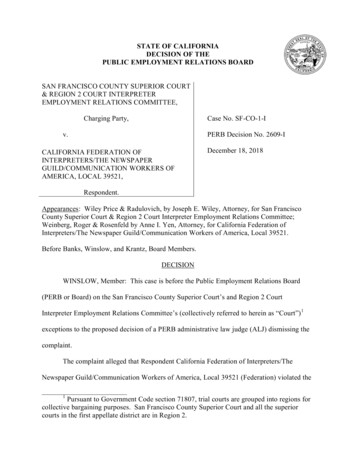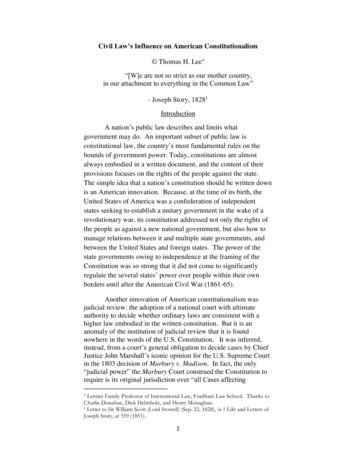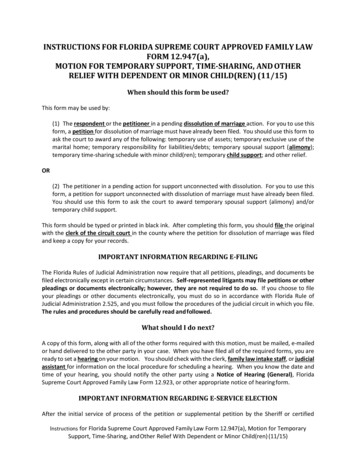
Transcription
THE STATUTES OF THE REPUBLIC OF SINGAPORESUPREME COURT OF JUDICATURE ACT(CHAPTER 322)(Original Enactment: Act 24 of 1969)REVISED EDITION 2007(31st July 2007)Prepared and Published byTHE LAW REVISION COMMISSIONUNDER THE AUTHORITY OFTHE REVISED EDITION OF THE LAWS ACT (CHAPTER 275)Informal Consolidation – version in force from 1/2/2021
CHAPTER 3222007 Ed.Supreme Court of Judicature ActARRANGEMENT OF SECTIONSPART IPRELIMINARYSection1.2.Short titleInterpretationPART IITHE SUPREME COURT3.4.5.5A.6.7.8.8A.Superior courtsPrecedenceActing appointmentInternational JudgesSealVacationsSittings in cameraCourt may conduct hearing through electronic means ofcommunicationPART IIIGENERAL DIVISIONOF HIGH COURTDivision 1 — ngs in General Division to be disposed of by singleJudgeAssessors to assist General DivisionWhen General Division is openSittings of General Division and distribution of business[Repealed]Writs of executionExecution of deed or indorsement of negotiable instrument1Informal Consolidation – version in force from 1/2/2021
2007 Ed.Supreme Court of JudicatureCAP. 322Division 2 — Original jurisdictionSection15.16.17.17A.18.Criminal jurisdictionCivil jurisdiction — generalCivil jurisdiction — specificCivil jurisdiction — concurrent jurisdiction with Syariah Courtin certain mattersPowers of General DivisionDivision 3 — Singapore InternationalCommercial Court18A.18B.18C.18D.18E.18F.18G.18H.Singapore International Commercial CourtPresident of Singapore International Commercial CourtAct to apply with modificationsJurisdiction of Singapore International Commercial Court[Repealed]Effect of jurisdiction agreementComposition of Singapore International Commercial CourtProvisions where Singapore International Commercial Courtcomprises 3 Judges18I. Powers of Singapore International Commercial Court, generally18J. Transfer of cases18K. Rules of evidence in certain cases18L. Determination of foreign law on submissions18M. Representation by foreign lawyers and law expertsDivision 4 — Appellate jurisdiction19.20.21.22.Appellate criminal jurisdictionAppellate civil jurisdictionAppeals from District and Magistrates’ CourtsPowers of rehearingDivision 5 — Supervisory and revisionaryjurisdiction23.24.25.26.27.Revision of criminal proceedings of subordinate courtsPower of General Division to call for records of civilproceedings in subordinate courtsPowers of General Division on revision of civil proceedingsNo revision at instance of party who could have appealedGeneral supervisory and revisionary jurisdiction of GeneralDivisionInformal Consolidation – version in force from 1/2/20212
3CAP. 322Section28.Supreme Court of JudicatureDiscretion of General Division as to hearing partiesDivision 6 — Allocation of proceedings28A.Allocation of proceedings to District Court or Family CourtDivision 7 — Matters that are non-appealableor appealable only with leave29.29A.No appeal in certain casesLeave required to appeal in certain casesDivision 8 — Further arguments29B.Further arguments before notice of appeal is filedDivision 9 — Allocation of appeals29C.29D.29E.Court to which appeal is to be madePower to transfer appeal to Court of AppealPower to transfer appeal to Appellate DivisionPART IVAPPELLATE DIVISION OF HIGH COURTDivision 1 — General30.31.32.33.34.PresidentJurisdiction — generalComposition — generalDecisions how madeSittingsDivision 2 — Civil jurisdiction35.36.37.38.39.40.41.42.43.44.45.Civil jurisdictionComposition — further provisionsOral hearing not needed for certain mattersSummary dismissal of certain mattersApplicationsIncidental directions and interim ordersHearing of appealsCosts of appealNew trialImmaterial errorsAppeal not to operate as stay of executionInformal Consolidation – version in force from 1/2/20212007 Ed.
2007 Ed.Supreme Court of JudicatureCAP. 322Division 3 — Matters that are non-appealable orappealable only with leaveSection46.47.No appeal in certain casesLeave required to appealPART VCOURT OF APPEALDivision 1 — General48.49.50.51.52.President and Vice-PresidentsJurisdiction — generalComposition — generalDecisions how madeSittingsDivision 2 — Civil vil jurisdictionComposition — further provisionsOral hearing not needed for certain mattersSummary dismissal of certain mattersApplicationsIncidental directions and interim ordersHearing of appealsCosts of appealNew trialImmaterial errorsAppeal not to operate as stay of executionDivision 3 — Criminal jurisdiction60D.60E.Criminal jurisdictionComposition when exercising criminal jurisdictionPART VIOFFICERS AND OFFICESDivision 1 — Registrar61.62.Appointment of Registrar, Deputy Registrar and AssistantRegistrarsPowers and duties of Registrar, Deputy Registrar and AssistantRegistrarsInformal Consolidation – version in force from 1/2/20214
5Supreme Court of JudicatureCAP. 3222007 Ed.Division 2 — SheriffSection63.64.65.65A.Sheriff, Deputy Sheriff and Assistant Sheriffs of Supreme CourtPowers and duties of SheriffSheriff not to act when an interested partySolicitor authorised to act as officer of SheriffDivision 3 — Accountant66.Accountant — his dutiesDivision 4 — Subordinate officers67.68.69.70.Subordinate officers of Supreme CourtCommissioners for oathsOaths of officersApportionment of workDivision 5 — Offices71.72.Registry of Supreme CourtRegistry to be open throughout the yearPART VIIMISCELLANEOUS PROVISIONSDivision 1 — List of touts73.List of toutsDivision 2 — Measures for dealing withunmeritorious or vexatious proceedingsand vexatious litigants73A.73B.73C.73D.74.Measures for dealing with unmeritorious or vexatiousproceedingsLimited civil restraint ordersExtended civil restraint ordersGeneral civil restraint ordersVexatious litigantsDivision 3 — Disabilities of Registrar and otherofficers75.76.77.Disqualification of RegistrarRegistrar not to act where interestedOfficers of Supreme Court not to bid at sales under any writtenlawInformal Consolidation – version in force from 1/2/2021
2007 Ed.Section78.Supreme Court of JudicatureCAP. 322Misconduct of officersDivision 4 — Protection of Registrar and other persons79.Protection of Registrar and other personsDivision 5 — Rules of Court80.Rules of CourtDivision 6 — Council of Judges81.Council of Judges to consider operation of this Act, etc.Division 7 — Supplemental82.83.Conversion of pending petitions and motions to writs ofsummons, originating summonses and summonsesAmendment of Third to Ninth SchedulesFirst Schedule — Additional powers of GENERALDIVISIONSecond ScheduleThird Schedule — Orders Made by District Court orMagistrate’s CourtThat Are APPEALABLE ONLY WITHLEAVEFourth Schedule — DECISIONS OF GENERAL DIVISIONTHAT ARE NOT APPEALABLEFifth Schedule — Decisions of General Division that areappealable only with Leave,and certain exceptionsSixth Schedule — Civil Appeals to be made to Court ofAppealSeventh Schedule— Cases where Civil Jurisdictionof Appellate Division or Court of Appealcan be exercised by less than 3 JudgesEighth Schedule — Appeals that may be decided byAppellate Division or Court Of Appealwithout hearing oral argumentsNinth Schedule — Cases where decision of AppellateDivisionis not appealableInformal Consolidation – version in force from 1/2/20216
7CAP. 322Supreme Court of Judicature2007 Ed.An Act to provide for the jurisdiction and powers of the superiorcourts of judicature.[Act 40 of 2019 wef 02/01/2021][9th January 1970]PART IPRELIMINARYShort title1. This Act may be cited as the Supreme Court of Judicature Act.Interpretation2. In this Act, unless the context otherwise requires —“Appellate Division” means the Appellate Division of the HighCourt;[Act 40 of 2019 wef 02/01/2021]“court” means the General Division, the Appellate Division, orthe Court of Appeal;[Act 40 of 2019 wef 02/01/2021]“Family Division of the High Court” means the Family Divisionof the High Court constituted under section 4 of the FamilyJustice Act 2014;[Act 27 of 2014 wef 01/10/2014]“Family Justice Rules” means the Family Justice Rules madeunder the Family Justice Act 2014 and any other written lawby the Family Justice Rules Committee constituted undersection 46(1) of that Act;[Act 27 of 2014 wef 01/10/2014]“General Division” means the General Division of the HighCourt;[Act 40 of 2019 wef 02/01/2021]“Judge” means a Supreme Court Judge, a JudicialCommissioner, a Senior Judge or an International Judge,and —Informal Consolidation – version in force from 1/2/2021
2007 Ed.Supreme Court of JudicatureCAP. 3228(a) in relation to the General Division, means a Judgesitting in that Division in accordance with theConstitution and this Act;(b) in relation to the Appellate Division, means a Judgesitting in that Division in accordance with theConstitution and this Act; and(c) in relation to the Court of Appeal, means a Judgesitting in that Court in accordance with theConstitution and this Act;[Act 40 of 2019 wef 02/01/2021][Deleted by Act 40 of 2019 wef 02/01/2021][Deleted by Act 42 of 2014 wef 01/01/2015]“Registrar” means the Registrar of the Supreme Court andincludes the Deputy Registrar and the Assistant Registrars;“Rules of Court” means Rules of Court made under this Act andincludes forms;“seal” includes stamp;“subordinate court” means a court constituted under the StateCourts Act (Cap. 321), a Family Court or Youth Courtconstituted under the Family Justice Act 2014, and any othercourt, tribunal or judicial or quasi-judicial body from thedecisions of which under any written law there is a right ofappeal to the Supreme Court;[Act 40 of 2019 wef 02/01/2021]“Supreme Court Judge” means the Chief Justice, a Justice of theCourt of Appeal, a Judge of the Appellate Division or a Judgeof the High Court.[58/73; 16/93; 3/96][Act 5 of 2014 wef 07/03/2014][Act 27 of 2014 wef 01/10/2014][Act 40 of 2019 wef 02/01/2021]Informal Consolidation – version in force from 1/2/2021
9CAP. 322Supreme Court of Judicature2007 Ed.PART IITHE SUPREME COURTSuperior courts3. It is declared that the General Division of the High Court, theAppellate Division of the High Court and the Court of Appeal aresuperior courts of record.[Act 40 of 2019 wef 02/01/2021]Precedence4. The Supreme Court Judges rank in the following order:(a) the Chief Justice;(b) the Vice-Presidents of the Court of Appeal according to theorder of their appointments;(c) the Justices of the Court of Appeal (other than theVice-Presidents of the Court of Appeal) according to theorder of their appointments;(d) the President of the Appellate Division (if the Chief Justiceis not the President of the Appellate Division);(e) the Judges of the Appellate Division (other than thePresident of the Appellate Division) according to the orderof their appointments;(f) the Judges of the High Court according to the order of theirappointments.[Act 40 of 2019 wef 02/01/2021]Acting appointment5.—(1) Whenever during any period, owing to illness or absencefrom Singapore or any other cause, the Chief Justice is unable toexercise the powers or perform the duties of his office, such powersshall be had and may be exercised and such duties shall be performedby the Judge having precedence next after the Chief Justice who ispresent in Singapore and able to act during that period.(2) For the purposes of this section, temporary absence in any partof Malaysia shall not be deemed to be absence from Singapore.Informal Consolidation – version in force from 1/2/2021
Supreme Court of Judicature2007 Ed.CAP. 32210International Judges5A. An International Judge may only sit in the SingaporeInternational Commercial Court, in an appeal from a decision ofthat Court, and in an application relating to such an appeal.[Act 40 of 2019 wef 02/01/2021]Seal6. The Supreme Court is to have a seal or seals of such nature andpattern as the Chief Justice may, by notification in the Gazette,prescribe.[Act 40 of 2019 wef 02/01/2021]Vacations7. The Chief Justice may specify vacations of the Supreme Court,which must not exceed 2 months in any year.[Act 40 of 2019 wef 02/01/2021]Sittings in camera8.—(1) The place in which any court is held for the purpose oftrying any cause or matter, civil or criminal, shall be deemed an openand public court to which the public generally may have access.(2) The court shall have power to hear any matter or proceeding orany part thereof in camera if the court is satisfied that it is expedient inthe interests of justice, public safety, public security or propriety, orfor other sufficient reason to do so.[Act 19 of 2018 wef 31/10/2018](2A) A court may, in any matter or proceeding or any part thereoftried or held or to be tried or held before it, if satisfied that it isexpedient in the interests of justice, public safety, public security orpropriety, or for other sufficient reason to do so, order that —(a) the name, address or photograph of any witness; or(b) any evidence or any other thing likely to lead to theidentification of such witness by a person other than theparty to that matter or proceeding,which is contained in any court document intended to be producedbefore the court, be removed or be sufficiently redacted.[15/2010 wef 02/01/2011]Informal Consolidation – version in force from 1/2/2021
11CAP. 322Supreme Court of Judicature2007 Ed.(3) A court may at any time order that no person shall —(a) publish the name, address or photograph of any witness inany matter or proceeding or any part thereof tried or held orto be tried or held before it, or any evidence or any otherthing likely to lead to the identification of any suchwitness; or(b) do any other act which is likely to lead to the identificationof such a witness.[15/2010 wef 02/01/2011](4) Any person who acts in contravention of any order undersubsection (2A) or (3) shall be guilty of an offence and shall be liableon conviction to a fine not exceeding 5,000 or to imprisonment for aterm not exceeding 3 years or to both.[15/2010 wef 02/01/2011](5) A court that hears the whole or any part of any matter orproceeding in camera may, in its discretion, permit any of thefollowing individuals to be present in the courtroom while that matteror proceeding is heard in camera:(a) any journalist who reports news for a newspaper or abroadcasting service;(b) any individual whom the court determines has a sufficientinterest in that matter or proceeding;(c) any other individual that the court specifies in anyparticular case.[Act 19 of 2018 wef 31/10/2018](6) For the purposes of subsection (2), the matters that the courtmay consider, when deciding whether it is expedient in the interestsof justice, public safety, public security or propriety, or for othersufficient reason, to hear the whole or any part of any matter orproceeding in camera, include the following matters:(a) whether the defence of any accused person in that matter orproceeding will be prejudiced by the presence of anymember of the public in the courtroom;Informal Consolidation – version in force from 1/2/2021
2007 Ed.Supreme Court of JudicatureCAP. 32212(b) whether any accused person or witness in that matter orproceeding has any legitimate interest in privacy that needsto be protected;(c) whether the object of that matter or proceeding will bedefeated by publicity if that matter or proceeding is heardin open court;(d) whether any accused person or witness in that matter orproceeding has any legitimate interest in protecting theconfidentiality of any information that may be disclosedduring the hearing of that matter or proceeding;(e) whether any information that may be disclosed during thehearing of that matter or proceeding will be prejudicial tothe interests of Singapore.[Act 19 of 2018 wef 31/10/2018](7) In this section —“broadcasting service” has the same meaning as in section 2(1)of the Broadcasting Act (Cap. 28);“newspaper” has the same meaning as in section 2(1) of theNewspaper and Printing Presses Act (Cap. 206).[Act 19 of 2018 wef 31/10/2018]Court may conduct hearing through electronic means ofcommunication8A.—(1) Without limiting section 8, the court may conduct thehearing of any matter or proceeding through a live video link, a livetelevision link or any other electronic means of communication.(2) Subsection (1) does not affect the operation of section 62A ofthe Evidence Act (Cap. 97) and section 281 of the Criminal ProcedureCode (Cap. 68).[Act 46 of 2018 wef 01/01/2019]Informal Consolidation – version in force from 1/2/2021
13CAP. 322Supreme Court of Judicature2007 Ed.PART IIIGENERAL DIVISIONOF HIGH COURT[Act 40 of 2019 wef 02/01/2021]Division 1 — General[Act 40 of 2019 wef 02/01/2021]9. [Repealed by Act 40 of 2019 wef 02/01/2021]Proceedings in General Division to be disposed of by singleJudge10.—(1) Every proceeding in the General Division and all businessarising thereout shall, except as otherwise provided by any writtenlaw for the time being in force, be heard and disposed of before asingle Judge.[Act 40 of 2019 wef 02/01/2021](2) A Judge may, subject to Rules of Court or Family Justice Rules,exercise in court or in chambers all or any part of the jurisdictionvested in the General Division, in all such causes and matters and inall such proceedings in any causes or matters as might immediatelybefore 9th January 1970 have been heard in court or in chambersrespectively by a single Judge, or as may be directed or authorised tobe so heard by Rules of Court or Family Justice Rules for the timebeing in force.[Act 27 of 2014 wef 01/10/2014][Act 40 of 2019 wef 02/01/2021](3) [Deleted by Act 42 of 2014 wef 01/01/2015](4) If a Judge reserves judgment in any proceedings and hisappointment as a Judge expires or is terminated before his judgmentis delivered, he shall have power to deliver judgment in respect ofthose proceedings, notwithstanding that his appointment as a Judgehas expired or has been terminated.[3/96](5) No Judge shall sit in the General Division on the hearing of, ordetermine any application in proceedings incidental or preliminaryto —Informal Consolidation – version in force from 1/2/2021
2007 Ed.Supreme Court of JudicatureCAP. 32214(a) an appeal from a judgment or an order made by him as thePresiding Judge of the State Courts or the Presiding Judgeof the Family Justice Courts;[Act 27 of 2014 wef 01/10/2014](b) an appeal against a conviction before him or a sentencepassed by him as the Presiding Judge of the State Courts orthe Presiding Judge of the Family Justice Courts;[Act 27 of 2014 wef 01/10/2014](c) the consideration of any case stated by him undersection 395 of the Criminal Procedure Code (Cap. 68) asthe Presiding Judge of the State Courts or the PresidingJudge of the Family Justice Courts;[Act 27 of 2014 wef 01/10/2014](d) any application made under section 400 of the CriminalProcedure Code in relation to any judgment or order made,or sentence passed, by him as the Presiding Judge of theState Courts or the Presiding Judge of the Family JusticeCourts; or[Act 27 of 2014 wef 01/10/2014](e) any proceedings relating to any judgment, order ordirection made by him as the Presiding Judge of theState Courts or the Presiding Judge of the Family JusticeCourts.[Act 5 of 2014 wef 14/04/2014][Act 27 of 2014 wef 01/10/2014][Act 40 of 2019 wef 02/01/2021]Assessors to assist General Division10A.—(1) In any proceedings before the General Division, theCourt may, if it thinks fit on the application of any party, or on its ownmotion, summon to its assistance, in such manner as may beprescribed by Rules of Court or Family Justice Rules, one or morepersons of skill and experience in the matter to which the proceedingsrelate who may be willing to sit with the Court and act as assessors.[16/93][Act 27 of 2014 wef 01/10/2014][Act 40 of 2019 wef 02/01/2021]Informal Consolidation – version in force from 1/2/2021
15CAP. 322Supreme Court of Judicature2007 Ed.(2) Subject to subsection (3), the remuneration of assessors forsitting under this section shall be at such rate as may be prescribed byRules of Court or Family Justice Rules and shall be costs in theproceedings unless otherwise ordered by the General Division.[16/93][Act 27 of 2014 wef 01/10/2014][Act 40 of 2019 wef 02/01/2021](3) Where one or more assessors are summoned for the purposes ofthis section otherwise than on the application of a party to theproceedings, the remuneration of any such assessor shall be payableout of moneys provided by Parliament.[16/93](4) Where any person is proposed to be summoned as an assessor,objection to him, either personally or in respect of his qualification,may be taken by any party in the prescribed manner.[16/93][Act 40 of 2019 wef 02/01/2021]When General Division is open10B.—(1) Subject to subsection (2), the General Division shall siton every day of the year except on Saturdays, Sundays and publicholidays.[8/98; 2/2007][Act 40 of 2019 wef 02/01/2021](2) Notwithstanding subsection (1), a Judge may lawfully sit on aSaturday, Sunday or public holiday or during a vacation prescribedunder section 7 if —(a) the Chief Justice has directed the Judge to sit on that day orduring that vacation; or(b) in the opinion of the Judge, the business to be despatched isextremely urgent.[8/98; 2/2007][Act 40 of 2019 wef 02/01/2021]Informal Consolidation – version in force from 1/2/2021
Supreme Court of Judicature2007 Ed.CAP. 32216Sittings of General Division and distribution of business11.—(1) The General Division shall sit at such times and at suchplaces as the Chief Justice shall from time to time appoint.[Act 40 of 2019 wef 02/01/2021](2) The distribution of business among the several Judges shall bemade in accordance with such directions, which may be of a generalor a particular nature, as may be given by the Chief Justice.[Act 40 of 2019 wef 02/01/2021]12. [Repealed by Act 40 of 2019 wef 02/01/2021]Writs of execution13. A judgment for the payment of money to any person or intocourt may be enforced by a writ, to be called a writ of seizure and sale,under which all the property, movable or immovable, of whateverdescription, of a judgment debtor may be seized, except —(a) the wearing apparel and bedding of the judgment debtor orhis family, and the tools and implements of his trade, whenthe value of such apparel, bedding, tools and implementsdoes not exceed 1,000;(b) tools of artisans, and, where the judgment debtor is anagriculturist, his implements of husbandry and suchanimals and seed-grain or produce as may in the opinionof the court be necessary to enable him to earn hislivelihood as such;(c) the wages or salary of the judgment debtor;(d) any pension, gratuity or allowance granted by theGovernment; and(e) the share of the judgment debtor in a partnership, as towhich the judgment creditor is entitled to proceed to obtaina charge under any provision of any written law relating topartnership.[16/93][Act 40 of 2019 wef 02/01/2021]Informal Consolidation – version in force from 1/2/2021
17CAP. 322Supreme Court of Judicature2007 Ed.Execution of deed or indorsement of negotiable instrument14.—(1) If a judgment or order is for the execution of a deed, orsigning of a document, or for the indorsement of a negotiableinstrument, and the party ordered to execute, sign or indorse suchinstrument is absent, or neglects or refuses to do so, any partyinterested in having the same executed, signed or indorsed, mayprepare a deed, or document, or indorsement of the instrument inaccordance with the terms of the judgment or order, and tender thesame to the court for execution upon the proper stamp, if any isrequired by law, and the signature thereof by the Registrar, by order ofthe court, shall have the same effect as the execution, signing orindorsement thereof by the party ordered to execute.(2) Nothing in this section shall be held to abridge the powers of thecourt to proceed by attachment against any person neglecting orrefusing to execute, sign or indorse any such instrument.Division 2 — Original jurisdiction[Act 40 of 2019 wef 02/01/2021]Criminal jurisdiction15.—(1) The General Division shall have jurisdiction to try alloffences committed —(a) within Singapore;(b) on board any ship or aircraft registered in Singapore;(c) by any person who is a citizen of Singapore on the highseas or on any aircraft;(d) by any person on the high seas where the offence is piracyby the law of nations;(e) by any person within or outside Singapore where theoffence is punishable under and by virtue of the provisionsof the Hijacking of Aircraft and Protection of Aircraft andInternational Airports Act (Cap. 124) or the MaritimeOffences Act (Cap. 170B); andInformal Consolidation – version in force from 1/2/2021
2007 Ed.Supreme Court of JudicatureCAP. 32218(f) in any place or by any person if it is provided in any writtenlaw that the offence is triable in Singapore.[10/78; 16/93; 26/2003][Act 40 of 2019 wef 02/01/2021](2) The General Division may pass any sentence allowed by law.[Act 40 of 2019 wef 02/01/2021]Civil jurisdiction — general16.—(1) The General Division shall have jurisdiction to hear andtry any action in personam where —(a) the defendant is served with a writ of summons or anyother originating process —(i) in Singapore in the manner prescribed by Rules ofCourt or Family Justice Rules; or[Act 27 of 2014 wef 01/10/2014](ii) outside Singapore in the circumstances authorised byand in the manner prescribed by Rules of Court orFamily Justice Rules; or[Act 27 of 2014 wef 01/10/2014](b) the defendant submits to the jurisdiction of the GeneralDivision.[16/93][30/2010 wef 01/01/2011][Act 40 of 2019 wef 02/01/2021](2) Without prejudice to the generality of subsection (1), theGeneral Division shall have such jurisdiction as is vested in it by anyother written law.[16/93][Act 40 of 2019 wef 02/01/2021]Civil jurisdiction — specific17.—(1) Without prejudice to the generality of section 16, the civiljurisdiction of the General Division shall include —(a) jurisdiction under any written law relating to divorce andmatrimonial causes;Informal Consolidation – version in force from 1/2/2021
19CAP. 322Supreme Court of Judicature2007 Ed.(b) jurisdiction under any written law relating to matters ofadmiralty;(c) jurisdiction under any written law relating to bankruptcy orto companies;(d) jurisdiction to appoint and control guardians of infants andgenerally over the persons and property of infants;(e) jurisdiction to appoint and control guardians and keepersof the persons and estates of idiots, mentally disorderedpersons and persons of unsound mind;[Act 1 of 2017 wef 01/11/2017](f) jurisdiction to grant probates of wills and testaments,letters of administration of the estates of deceased personsand to alter or revoke such grants;[Act 1 of 2017 wef 01/11/2017][Act 4 of 2020 wef 12/09/2020](g) jurisdiction under the Mediation Act 2017 to record amediated settlement agreement made in a mediation, inrelation to a dispute for which no proceedings have beencommenced in a court, as an order of court; and[Act 1 of 2017 wef 01/11/2017][Act 1 of 2017 wef 01/11/2017][Act 4 of 2020 wef 12/09/2020](h) jurisdiction under the Singapore Convention on MediationAct 2020 to grant the applications provided for in that Actin respect of international settlement agreements.[Act 4 of 2020 wef 12/09/2020][Act 40 of 2019 wef 02/01/2021](2) In this section —“international settlement agreement” has the meaning given bysection 2(1) of the Singapore Convention on Mediation Act2020;“mediated settlement agreement” and “mediation” have themeanings given by the Mediation Act 2017 (Act 1 of 2017).[Act 4 of 2020 wef 12/09/2020]Informal Consolidation – version in force from 1/2/2021
2007 Ed.Supreme Court of JudicatureCAP. 32220Civil jurisdiction — concurrent jurisdiction with SyariahCourt in certain matters17A.—(1) Notwithstanding sections 16 and 17, the GeneralDivision shall have no jurisdiction to hear and try any civilproceedings involving matters which come within the jurisdictionof the Syariah Court under section 35(2)(a), (b) or (c) of theAdministration of Muslim Law Act (Cap. 3) in which all the partiesare Muslims or where the parties were married under the provisionsof the Muslim law.[20/99][Act 40 of 2019 wef 02/01/2021](2) Notwithstanding that such matters come within the jurisdictionof the Syariah Court under section 35(2)(d) or (e), 51 or 52(3)(c) or(d) of the Administration of Muslim Law Act, the General Divisionshall have jurisdiction as is vested in it by any written law to hear andtry any civil proceedings involving matters relating to —(a) maintenance for any wife or child;(b) custody of any child; and(c) disposition or division of property on divorce.[20/99][Act 40 of 2019 wef 02/01/2021](3) Where civil proceedings involving any matter referred to insubsection (2)(b) or (c) and involving parties who are Muslims orwere married under the provisions of the Muslim law are commencedin the General Division, the General Division shall stay the civilproceedings —(a) involving any matter referred to in subsection (2)(b) or (c),if the civil proceedings are commenced on or after thecommencement of proceedings for divorce in the SyariahCourt or after the making of a decree or order for divorceby the Syariah Court or on or after the registration of anydivorce under section 102 of the Administration of MuslimLaw Act (Cap. 3) between the same parties, unless aSyariah Court commencement certificate in respect of thecivil proceedings has been filed with the General Division;[Act 40 of 2019 wef 02/01/2021]Informal Consolidation – version in force from 1/2/2021
21CAP. 322Supreme Court of Judicature2007 Ed.(b) involving any matter referred to in subsection (2)(b), ifproceedings for divorce are commenced in the SyariahCourt or a decree or order for divorce is made by theSyariah Court or a divorce is registered under section 102of the Administration of Muslim Law Act between thesame parties after the commencement of the civilproceedings, unless a Syariah Court continuationcertificate
73C. Extended civil restraint orders 73D. General civil restraint orders 74. Vexatious litigants Division 3 — Disabilities of Registrar and other officers 75. Disqualification of Registrar 76. Registrar not to act where interested . This Act may be cited as the Supreme Court of Judicature Act. Interpretation 2. In this Act, unless the .
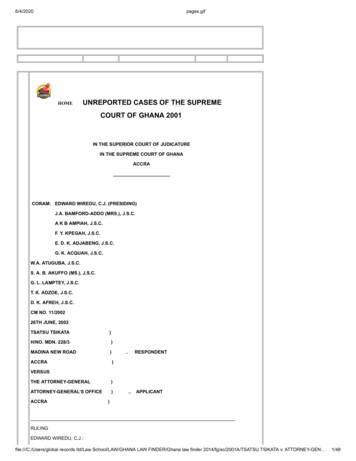
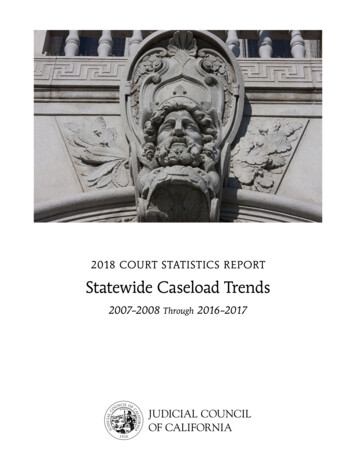
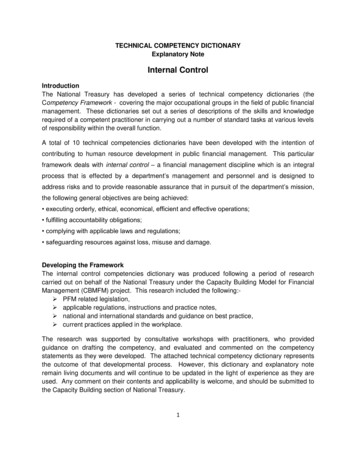
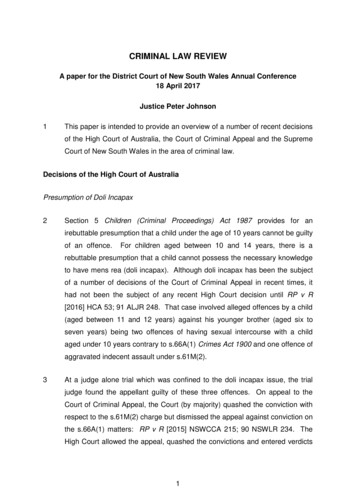
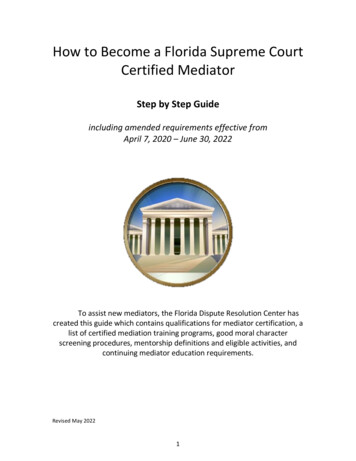
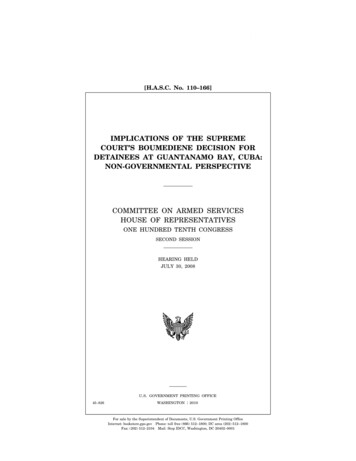
![[2021] Ccj 5 (Aj) Bb Appellate Jurisdiction on Appeal From the Court of .](/img/30/2021-ccj-5-aj-bb.jpg)

